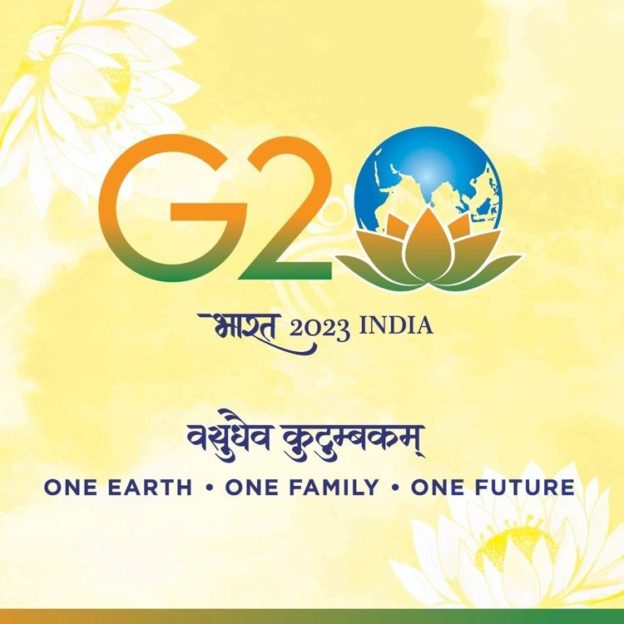In the recently concluded annual summit of G-20,the ‘special military operation’ of Russia against Ukraine was seen as an event which was causing immense global fragility, human suffering and the rising cost of living in the world besides rising food grain prices for the poorer economies.
G-20 formed during the heydays of globalization is now seen to be at the forefront of one of the most violent conflicts in post-cold war Europe. The Bali meeting held on 15-16th November was overshadowed by the Russia-Ukraine conflict. The Ukrainian President virtually addressed the summit as a special gesture by G-20 members, even though Ukraine is not a member of G-20.
G-20 is a representative body of developed and developing economies which was established as an informal grouping which first met in 1999. This was later formalized as a summit-level meeting of the 19 member countries plus the European Union after the economic turmoil in 2009.
Before travelling to Bali, Prime Minister Narendra Modi had declared that the theme of India’s Presidency would be “One Earth, One Family, One Future” emphasizing shared futures with equitable growth. Living to this spirit India has planned 200 G-20 meetings throughout the length and breadth of India, the preparatory and ministerial meetings culminating in grand plans for a G-20 summit, bringing all the 20 members to the penultimate summit in Delhi in the last quarter of 2023 in India. This move emphasizes decentering of Foreign Policy exercise which sadly has remained an elite project largely run through the power corridors of South Block in Delhi.
In the recently concluded annual summit of G-20,the ‘special military operation’ of Russia against Ukraine was seen as an event which was causing immense global fragility, human suffering and the rising cost of living in the world besides rising food grain prices for the poorer economies.The division exists among the G-20 members regarding participation in the western led sanction, but its members, barring of course Russia, decry Russia’s intervention in Ukraine. The level of polarization that was seen in the Bali Summit among its members was most visible towards the end of the summit when Heads of State evaded a photo-op and Putin did not attend the summit. Putin was represented by his Foreign Minister Sergey Lavrov. Even he left before any joint statement could be released by its members.This would be the most complex issue which would be confronted by the G-20 Presidency held by India. The summit had decried the Russian aggression on the US and had redeemed their national positions on Ukraine.
None of the above alters the situation in Ukraine. The war continues and there are chances that it may escalate in terms of human suffering in the coming winters not only for Ukraine but also for Western Europe, confronted by the short supply of inexpensive Russian gas. This would be the most pressing challenge that the Indian Presidency of the G-20 will have to confront.The failure of the United Nations and other multilateral institutions to take this challenge head-on has given the G-20 led by India a new challenge and an opportunity to show its world leadership. G-20 was born in the midst of a financial crisis. Today, the world is confronted again this time with an existential crisis of multilateral institutions in which a G-20 member and a Permanent Member of the UN Security Council are in a midst of bloody asymmetric conflict with a smaller power, Ukraine.India needs to evolve a consensus which will be a difficult proposition as the world is at an ‘inflection point’. Russia’s isolation has grown globally. Two major powers China and India have rejected Russia’s misadventure in Ukraine. India’s mantra was quoted by various world leaders as ‘this is not an era of war’ and added to this Prime Minister’s advice to China that ‘this is not an era of military expansionism’. India’s approach to the conflict in Ukraine should reflect this approach that this is neither an ‘era of war nor of expansionism’, whatever the compulsions might be. The doors of diplomacy, peaceful settlement of disputes through dialogue and respect of the territorial boundaries and sovereignty of the state.
India will have to rise up to the occasion and show its leadership to the world. Next year will be the test of its political leadership when it comes to international diplomacy. It will have to convince a recalcitrant Russia and bring Ukraine to the negotiating table, without hurting the sensibilities of the Russian, Ukrainians or the West. Here India’s strategic autonomy will come to its help, through which it has retained its goodwill with both sides and this was starkly visible when the issue of rescuing Indian students studying in Ukraine when the war started. Both Ukraine and Russia supported India’s successful rescue operations. The differences between the G-20 states are also quite glaring and this was reflected in the missed joint photo session. The differences between China and India are also glaring and need to be addressed for a consensual approach to be adopted by this forumwhichChinese President Xi Jinping had rejected as a “talk shop”.
India’s leadership of the forum will also have to address the failure of the multilateral institutions. It will have to build up a world opinion of change in the United Nations system which still is being organized on the post-second World War realities and also the failure to build a global unanimity on the ongoing conflicts in the world as seen in the ongoing Ukrainian conflict.
https://www.financialexpress.com/defence/indias-leadership-at-the-g-20-summit-and-the-resolution-of-the-russia-ukraine-conflict/2900218/





